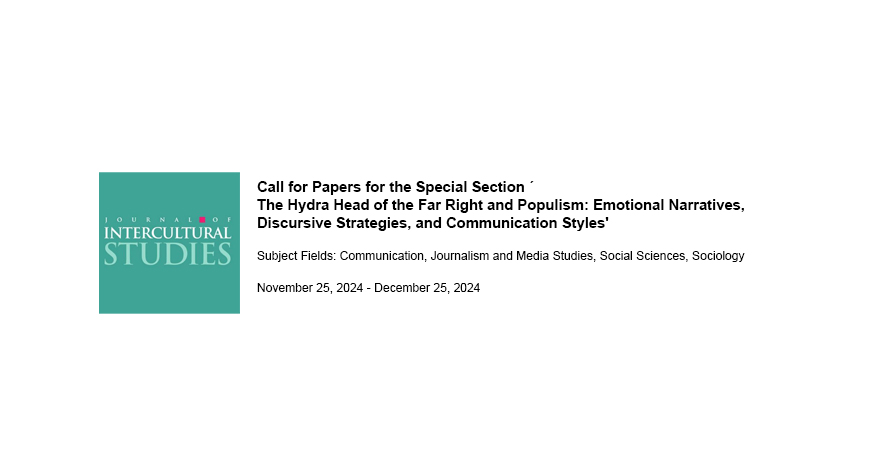The Special Section ´The Hydra Head of the Far Right and Populism: Emotional Narratives, Discursive Strategies, and Communication Styles’ stems from the international colloquium Emotions, Narratives and Identities in Politics, Populism and Democracy, which was held at the Center for Social Studies, University of Coimbra in January 2024. The Special Section is part of the research efforts undertaken by the team of the FCT funded project ´UNPOP: UNpacking POPulism: Comparing the Formation of Emotion Narratives and their Effects on Political Behaviour´.
The Special Section was accepted by the Journal of Intercultural Studies, and it is currently scheduled for publication in late 2025. ´The Special Section strives to move beyond the current infertile ontological debate (Mouffe, 2018) to examine how populism is communicated as something that is actively done (Hatakka, 2024; Jagers and Walgrave, 2007; Moffitt, 2016).
As the ´Introduction´ to the Special Section emphasises, scholarship on populism is disproportionately focused on the ideational framework introduced by Cas Mudde, which characterizes populism as a thin-centred ideology dividing society into antagonistic groups: the “pure people” versus the “corrupt elite” (Mudde, 2004). While this minimal definition has proven valuable for scholars – especially within political science – seeking to systematically analyse populism across various contexts, it has also proved to be inadequate when it comes to gauge and examine the nuances that characterise different sociopolitical landscapes (De La Torre and Mazzoleni, 2019). Moreover, since the ideational framework considers that all populist actors possess the same core ideology no matter what specific policies or discursive practices they adopt (Hawkins, 2018), it risks overgeneralisations by labelling a wide range of political movements as populist (Weyland, 2017). Recognizing and addressing these biases (Aslanidis, 2017), the Special Section ´The Hydra Head of the Far Right and Populism: Emotional Narratives, Discursive Strategies, and Communication Styles’ has gathered several contributions, each of which uniquely advances a nuanced understanding of populism and furthermore accounts for its adaptability to different socio-political contexts, emerging public debates, and societal crises.
The special section includes an article that explores how Bolsonarismo has facilitated cross-class and racial alliances, prominently featuring ‘resentful’ women in the anti-gender movement and manosphere in Brazil. Another article examines how the most prominent far-right leader in Portugal uses his Facebook profile to garner sympathy and support from both Portuguese and Brazilian audiences. A third piece analyses how far-right leaders, even within the same national context, draw on distinct emotional discursive repertoires, revealing tensions between anti- and pro-Western forms of populism in Turkey during the 2023 elections, particularly in relation to refugees and asylum seekers. Lastly, an article from the Baltic region highlights how the spread of information manipulation, particularly disinformation, has contributed to the rise of populism among Lithuanian politicians.
This call invites further contributions that critically assess the media strategies of populist actors (and movements that they stem from or belong to), focusing on how they utilize various platforms to engage different audiences in times of crisis and (un)democratic tensions. It encourages authors to examine the nuanced ways in which populist actors and/or movements adapt their discursive and communication strategies to navigate polarized and digitalized media environments.
Suggested Fields of Interest (not limited to):
- Media Studies and Communication
- Political Science and International Relations
- Sociology and Cultural Studies
- Psychology and Behavioural Studies
- Digital Humanities and Computational Social Science
In light of the most recent events and historical time we lived in, the call is especially open to contributions that examine how populism operates at times of heightened societal crises, including mass protests and international tensions caused by the ongoing wars in Ukraine, Palestine, Lebanon, and Congo as well as social unrest in post electoral contexts such as in Mozambique.
Abstracts and/or article drafts will be reviewed for acceptance by the guest editors of the Special Section on ongoing basis till December 22, 2024.
Full drafts of the article proposals accepted for publication are expected to be submitted by February 15, 2025.
We are aware these are tight deadlines. However, we encourage prospective contributors to see this call as an opportunity to bring past endeavours to completion with the assistance of an interdisciplinary and highly supportive team of guest editors.
Manuel João Cruz
manuelcruz@ces.uc.pt
References:
Aslanidis, P. (2017). Avoiding Bias in the Study of Populism. Chinese Political Science Review, 2(3), 266–287. https://doi.org/10.1007/s41111-017-0064-0
de La Torre, C., & Mazzoleni, O. (2019). Do we need a minimum definition of populism? An appraisal of Mudde’s conceptualization. Populism, 2(1), 79–95.
Hatakka, N. (2024). Populist political communication. In Y. Stavrakakis & G. Katsambekis (Eds.), Research Handbook on Populism (pp. 303–313). Edward Elgar.
Hawkins, K. (2018). The ideational approach. In C. de la Torre (Ed.), Routledge Handbook of Global Populism (1st ed., pp. 57–71). Routledge.
Jagers, J., & Walgrave, S. (2007). Populism as political communication style: An empirical study of political parties’ discourse in Belgium. European Journal of Political Research, 46(3), 319–345. https://doi.org/10.1111/j.1475-6765.2006.00690.x
Moffitt, B. (2016). The global rise of populism. Stanford University Press.
Mouffe, C. (2018). For a left populism. Verso.
Mudde, C. (2004). The populist zeitgeist. Government and Opposition, 39(4), 541–563. https://doi.org/10.1111/j.1477-7053.2004.00135.x
Weyland, K. (2017). Populism: a Political-Strategy Approach. In C. Rovira Kaltwasser, P. Taggart, P. O. Espejo, & P. Ostiguy (Eds.), Oxford Handbook of Populism (1st ed., pp. 48–72). Oxford: Oxford University Press.


